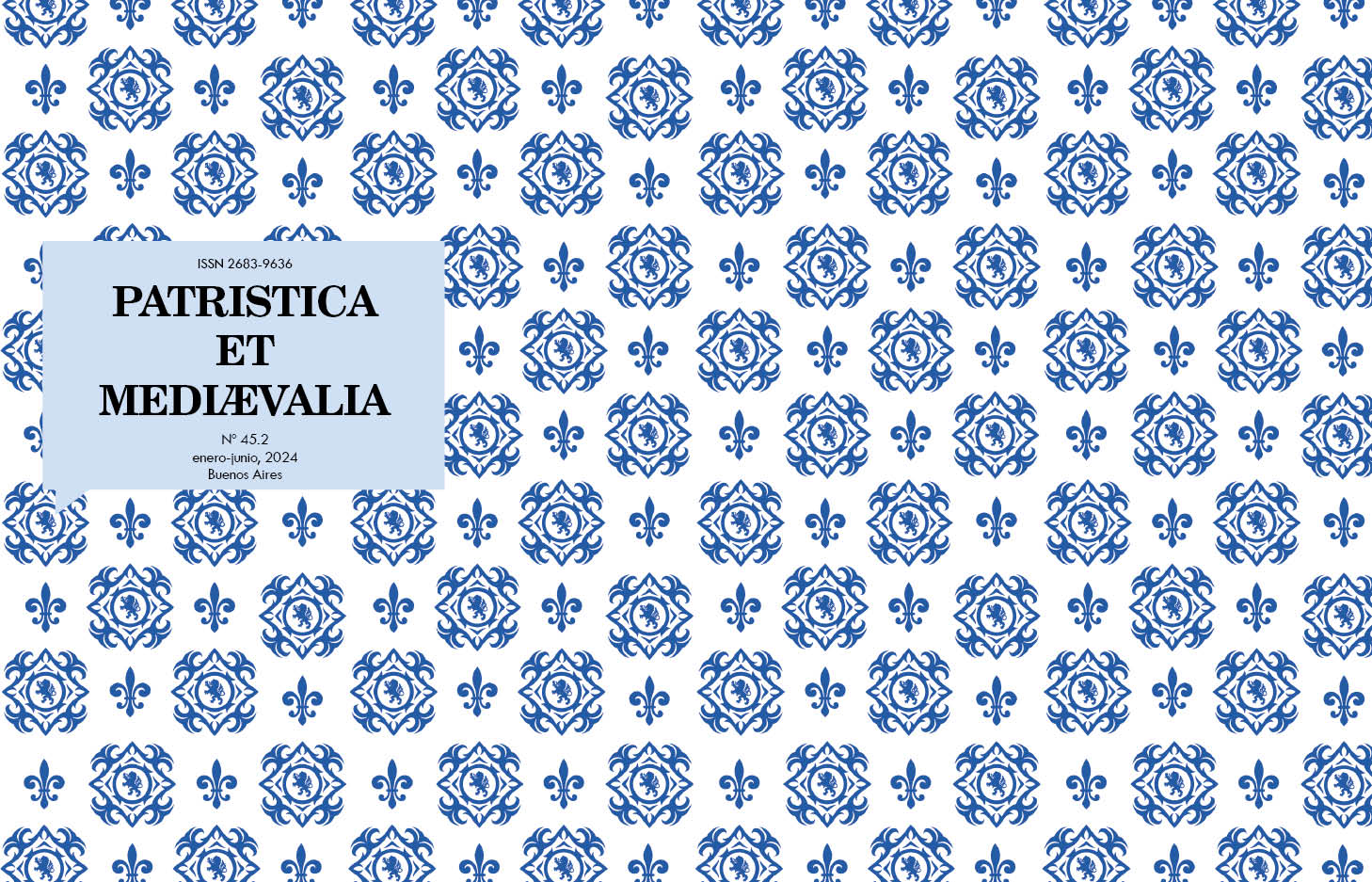The Concept of Will in Pietro Pomponazzi. A Reconstruction Based on De Fato, Libero Arbitrio et Praedestinatione
Abstract
This article aims to explore the concept of will in Pietro Pomponazzi, focusing on his treatise De fato, libero arbitrio et praedestinatione. Following the inherent dynamics of Pomponazzi’s thought, I examine the scope and limitations of the will within the realms of natural reason and theology. These two domains, clearly delineated and frequently in conflict in his work, form the basis for understanding the nuances of will. The study unfolds in two parts, initially addressing the will within the domain of natural reason and subsequently delving into its theological dimension. Finally, the translation of the quaestio “Utrum detur voluntas agens” from MS Paris, BnF, lat. 6449, is appended.Downloads
References
París, Bibliothèque Nationale de France, latin 6533.
París, Bibliothèque Nationale de France, latin 6449.
Alexander Aphrodisienis (1516). Hieronymi Bagolini Veronensis In interpretationem Alexandri Aphrodisei De fato…Verona: Andrea B. C. Impendio interpretis.
Eustracio (1543). Aristotelis Stagiritae Moralia Nichomachia cum Eustratii, Aspasii, Michaelis Ephesii, nonnullorumque aliorum graecorum explanationibus, nuper a Ioanne Bernardo Feliciano latinitate donata et cum antiquo codice collatione. París: Ioannem Roigny.
Averroes (1662). Aristotelis De Physico Auditu Libri Octo cum Averrois Cordubensis variis in eosdem commentariis. Venecia: Iunctas.
Alejandro de Afrodisia (1983). Alexander of Aphrodisias. On Fate.Londres: Duckworth.
Averroes (1953). Commentarium magnum in Aristotelis De anima libros. Ed. Crawford, F. S. Cambridge, MA: The Mediaeval Academy of America.
Eustratii et Michaelis et Anonyma (1892). In Ethica Nicomachea commentaria. Ed. Heylbut, G. Berlín: Typis et Impensis Georgii Reimeri.
Guillermo de Ockham (1981). Quaestiones in librum secundum Sententiarum (Reportatio). Ed. Gál, G. y Wood. Nueva York: The Franciscan Institute of St. Bonaventure University.
Joannis Duns Scotus (1969). Opera Philosophica (Opera omnia 4). París: Louis Vivès. Repr. Westeead: Gregg International Publishers.
Pietro Pomponazzi (2012). Fragmenta super libros de anima. Ed. Mojsish, B. URL: https://www.hs-augsburg.de/~harsch/Chronologia/Lspost15/Pomponatius/pom_fr00.html [último acceso: 15 de junio de 2024]
Themistius (1890). In libros Aristotelis De anima paraphrasis. Ed. Heinze, R. Berlín: Typis et Impensis Georgii Reimeri.
Tomás de Aquino (1891), Summa Theologica (Opera Omnia 6). Ed. Leonina: Roma.
Pietro Pomponazzi (2013). Apologia. Ed. y trad. Raimondi F. P. y García Valverde J. M. En: Tutti i trattati peripatetici. Milán: Bompiani.
Pietro Pomponazzi (2004). Il fato, il libero arbitrio e la predestinazione (2 vols.). Trad. Perrone Compagni, V. Turín: Nino Aragno Editore.
Pietro Pomponazzi (2010). Tratado sobre la inmortalidad del alma. Trad. García Valverde, J. Madrid: Tecnos.
Pietro Pomponazzi (1999). Trattato sull’immortalità dell’anima. Trad. Perrone Compagni, V. Florencia: Leo S. Olschki Ediotre.
Bianchi, L. (2011). Pour une histoire de la “double vérité”. París: Vrin.
Effler, R. R. (1962). John Duns Scotus and the Principle “Omne quod movetur ab alio movetur”. Nueva York: The Framciscan Institute.
García Valverde, J. M. (2010). “Estudio preliminar”. En: Pietro Pomponazzi. Tratado sobre la inmortalidad del alma. Trad. Idem. Madrid: Tecnos, XI-XCVI.
Nardi, B. (1965). Studi su Pietro Pomponazzi. Florencia: Felice Le Monnier.
Normore, C. G. (1998). “Picking and Choosing: Anselm and Ockham on Choice”, Vivarium 36.1, 23-39.
Panaccio, C. (2012). “Intellections and Volitions in Ockham’s Nominalism”. En: Pickavé, M. y Shapiro, L. (eds.). Emotion and Cognitive Life in Medieval and Early Modern Philosophy. Oxford: Oxford University Press.
Perrone Compagni, V. (2004). “Critica e riforma del cristianesimo nel De fato di Pomponazzi”. En: Pietro Pomponazzi. Il fato, il libero arbitrio e la predestinazione. Trad. Idem. Turín: Nino Aragno Editore: IX-CLXXX.
Pine, M. (1973). “Pietro Pomponazzi and the Scholastic Doctrine of Free Will”, Rivista Critica di Storia della Filosofía 28.1, 3-27.
Poppi, A. (1988). “Fate, Fortune, Providence and Human Freedom”. En: Schmitt, C. B., Skinner, Q., Kessler E. y Kraye, J. (eds.). The Cambridge History of Renaissance Philosophy. Cambridge: Cambridge University Press, 641-667.
Raimondi, F. (2010). “Ragione e fede, necessità e libertà: possibili chiavi di lettura del De fato”. En: Sgarbi, M. (ed.). Pietro Pomponazi: tradizione e dissenso. Atti del congreso internazionale di studi su Pietro Pomponazzi, Mantoga 23-24 ottobre 2008. Florencia: Leo S. Olschki, 107-130.
Ramberti, R. (2007). Il problema del libero arbitrio nel pensiero di Pietro Pomponazzi. La dottrina ética del De fato: spunti di critica filosófica e teologica nel Cinquecento. Florencia: Leo S. Olschki Editore.
Vitale, P. (2011). “Un aristotelismo ‘problemático’: Libertà e neccesità nel De fato di Pietro Pomponazzi”, Lo Sguardo. Rivista di Filosofía 5.1, 133-149.
1. The authors who publish in this magazine accept the following conditions:
-
They retain the copyright and grant to the magazine the right of the first publication, with the work registered under the Attribution-ShareAlike 4.0 International License that allows third parties to use what is published as long as they mention the authorship of the work and the first publication in this magazine.
-
They can make other independent and additional contractual agreements for the non-exclusive distribution of the version of the article published in this magazine (eg. include it in an institutional repository or publish it in a book) provided that they clearly indicate that the work was first published in this journal.
-
They are allowed and recommended to publish their work on the Internet (for example on institutional or personal pages).
2. AutoArchive Conditions. Authors are allowed and encouraged to distribute post-print electronic versions of their manuscripts because it promotes their circulation, a possible increase of quotation and a major reach among the Academic community. Color RoMEO: blue.













